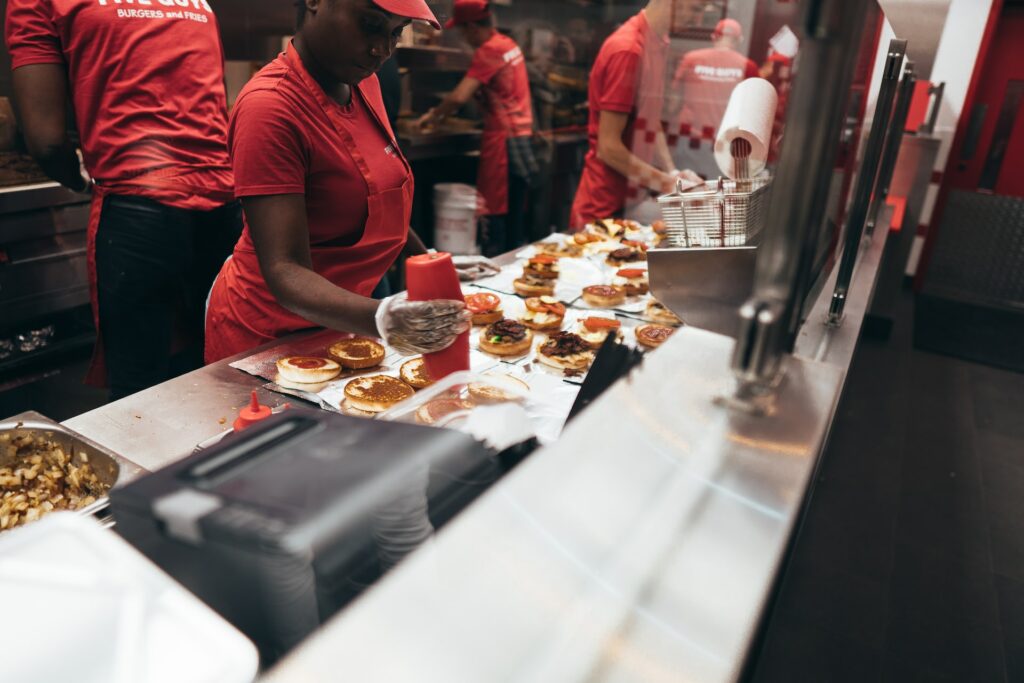If you’ve considered buying a franchise, there are a few factors you must consider before you can choose which franchise you should go for.
From the obvious (brand name, royalty fee) to the less obvious factors like territory protection, training and support, make sure to consider all these aspects before you make a decision.
Continue reading to learn about the factors you should consider when choosing an affordable franchise. Let’s dive in!
Post Contents
1.) Territory Protection
Some franchises provide franchisees with territory protection. This means that they guarantee you no other franchisee(s) from the same chain will be able to operate in a certain perimeter.
For example, if you were to open a Five Guys franchise in a certain city, the franchisor would agree with you on a certain perimeter (the city as a whole, or certain districts) where no other Five Guys restaurants would be allowed to operate.
In short, territory protection ensures you are avoiding sales cannibalization from the same franchises.
2.) Investment
This one seems obvious but isn’t. Whenever you open a new franchise, you must pay a certain amount of money to cover startup costs.

Startup costs can be building costs, equipment & hardware, working capital, starting inventory, etc.
The investment cost varies significantly from one franchise to another. To give you an idea, it costs on average $1.6 million to open a new restaurant franchise in the US.
This is the cost you must pay for as the franchisee (the franchisor usually also invests a certain amount).
Of course, the investment can be funded out of your own pocket, but most often a big chunk would be funded with a SBA loan.
3.) Passive Vs. Active Investment
Some franchises allow franchisees to run the business as a passive investment.
This means the franchisee pays the initial franchise fee, invests the required amount to set up the franchise, hire people and management but isn’t fully involved in the day-to-day operations.
This is a red flag for some. Indeed, some investors are interested in running multiple franchises, and as such, can’t work full time for each.
Instead they hire a General Manager who oversees the operations under the franchisee.
4.) Experience
Most franchises require franchisees to demonstrate solid experience and track record in the industry they are involved in.
For example, a restaurant chain would ask franchisees to have spent a minimum number of years in the restaurant industry as managers.
But some franchises don’t have such a requirement. This allows entrepreneurs and investors with minimum or no experience to get into a new business.
Often, these franchises are smaller businesses and the franchisor provides a lot of training and support to its franchisees.
5.) Brand Name
If you’re considering buying a franchise, you should take into account brand name. This goes without saying. Indeed, the higher the awareness, the higher the demand.

This is especially true if you’re considering starting a franchise in a location where the brand doesn’t have any franchises and where customers may not even know the brand.
For example, franchisees who opt for the fast food giants like Subway, McDonald’s etc. to name a few don’t have to worry about people knowing the brand, and customers setting foot in their store.
6.) Royalty Fees
In addition to the upfront investment, you will need to pay the franchisor royalty fees.
This is a percentage of your revenues that will go to the franchisor to pay for you to use their name, their goodwill, their equipment, training, etc.
It’s very important for you to prepare financial projections when considering buying a franchise. Indeed, often franchisors charge a total fee of around 10% of revenue to cover for both royalty and marketing fees.
That’s 10% of your sales that you will need to pay to the franchisor. Again, no need to stress how this can significantly eat your profit margins.
Therefore, make sure to deduct these royalty fees from your profits to understand the real profitability of the business, and how much money you can really make from it.
That’s something you can assess by calculating the payback period: the time it would take you to reimburse your initial investment (see above).
7.) Training & Support
Whether you have a solid experience or not, it’s always best to be part of a franchise that does provide a lot of training and support to its franchisees.
This includes both the initial training, which almost all franchises do provide, as well as ongoing support and consultancy once your franchise is up and running.
Yet, not all franchises provide the same level of support. This is something that you can look into the Franchise Disclosure Document: franchisors explain the type and level of support and training they provide to their franchisees. It can be about real estate, operations, management, HR, finance, etc.
Just make sure you understand the scope of support that is provided, and whether you would have to pay for it or not.






























